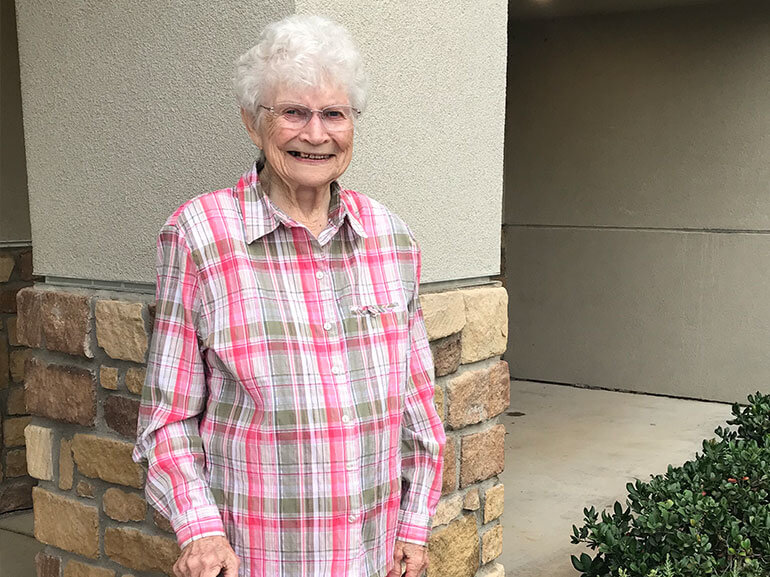Melba's Story

The year 2020 turned Melba Erwin’s life upside down.
Melba, 90, was accustomed to leading a busy life full of caregiving for her husband at home, spending time with her two children, three grandchildren and six great-grandchildren, socializing with friends and being involved at church. She also found energy to participate in hobbies such as crocheting, reading and gardening.
But as spring was on its way out and summer was set to arrive, Melba’s life drastically changed. It started with the passing of her husband at the end of May followed by a serious medical issue of her own in early June. Melba’s daughter, Joy, recalls finding her mom that morning in a state of confusion and stumbling around the house. Melba was taken to Harris Hospital in Fort Worth where she was diagnosed with a left middle cerebral artery stroke.
After she was stabilized and spent a few days recovering, Melba was discharged and transferred to Select Rehabilitation Hospital of Denton to continue her post-acute recovery and rehabilitation. Melba had actually been at the same rehabilitation hospital a year prior, and the family chose for her to return since she’d previously had a positive experience.
Melba’s injury brought a myriad of challenges. “I just didn’t know what was going on. I couldn’t do anything,” Melba said. Following her stroke, she faced difficulties walking independently due to right-sided weakness and completing basic tasks of daily living, such as eating and feeding herself. Melba also experienced severe expressive and receptive aphasia affecting her ability to understand and communicate basic thoughts, wants and needs.
Melba and her family remained hopeful that she would return home after regaining some level of independence, but they were not sure of what level of recovery was possible.
Melba’s physical therapy included working on her walking by using a rolling walker and navigating through obstacles with distractions to improve her safety and independence. She also performed balance and reaching activities similar to activities she performed in her home prior to her stroke. She used the SCIFIT recumbent stepper to improve her endurance and leg strength and worked on navigating stairs to improve her mobility in the community.
Occupational therapy treatments for Melba focused on showering and grooming, getting dressed, fine motor tasks, visual spatial processing and attention and transferring to a shower chair or toilet. Therapists also helped to address her midline sitting to improve safety with daily activities and improve her overall balance.
Speech therapists provided treatment to improve Melba’s cognition and address her expressive aphasia. Her initial treatments focused on retaining basic attention and yes or no questions for expression of her needs and wants. She progressed to being able to recall biographical information and initiate communication.
All therapy disciplines worked to help Melba with her confusion, occasional agitation, poor judgement and distractibility to help her be as independent as possible once she discharged home.
Melba’s family attended family training so they could safely and confidently provide home care after discharge. This training also included stroke education with resources, as Melba was not able to understand the material at the time of her stay.
After 16 days at Select Rehabilitation Hospital of Denton, Melba was ready to return home with her daughter. By discharge, she was able to walk 300 feet with a rolling walker with someone nearby. She also was able to do 12 stair steps using the handrails and pick up items from the floor, with the hope of getting back to gardening. For personal grooming, Melba only required minimal assistance for showering and upper body dressing. She was also able to name people and items in her picture book, read one syllable words and had significantly improved comprehension.
On a three-month post-discharge check in, Melba was receiving outpatient physical and speech therapy at Select Rehabilitation Hospital of Denton several days per week. She no longer needed a wheelchair, but still used a cane when walking outside of the house. She was performing most activities of daily living independently and had returned to her hobbies. She also was getting together with her friends and continuing to make strides in her cognition.
Melba’s family has played a vital supportive role throughout her full recovery journey and continue to be involved in every aspect of her rehabilitative process.
When asked how she felt about her therapy services at Select Rehabilitation Hospital, Melba said, “They have been so good to me. I’m so glad they helped me.”